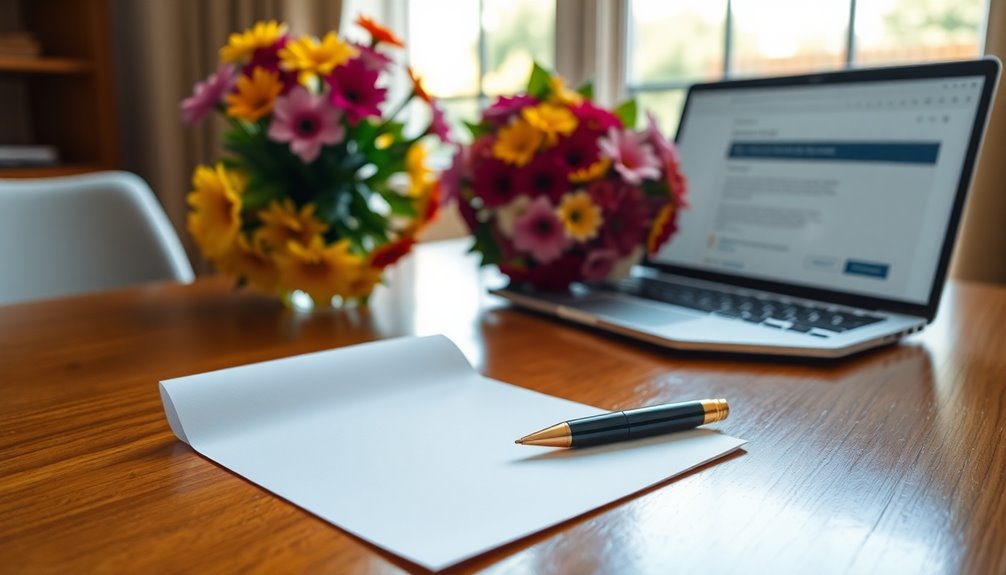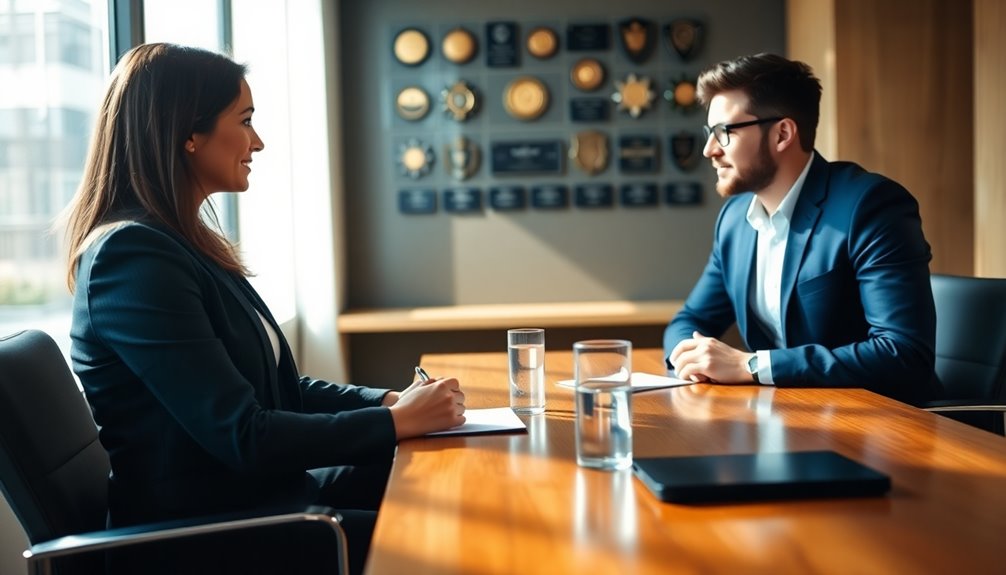Sending a targeted thank-you letter can really boost your chances of landing that second call. Start by expressing genuine gratitude for the opportunity and mention specific topics from your interview. This personal touch shows you were engaged. Highlight your qualifications that align with the role and keep it concise—no one wants to wade through a long letter. Aim to send it within 24-48 hours, and don't forget to proofread for errors. A strong follow-up can also reinforce your interest and qualifications. If you want to discover more effective strategies, you won't want to miss what's next.
Key Takeaways
- Send your thank-you email within 24-48 hours to maximize its impact and demonstrate promptness.
- Personalize your message by referencing specific topics discussed to show genuine engagement.
- Highlight key qualifications and skills that align with the job to reinforce your fit.
- Keep the email concise and focused to maintain the reader's attention and clarity.
- Follow up if you haven't heard back after a week to express sustained interest.
Importance of a Thank-You Email

A thank-you email is an essential part of the job interview process that can set you apart from other candidates. In today's competitive job market, sending a thank-you email can considerably showcase your passion and interest in the position. Research shows that 51% of hiring managers say these emails can influence their hiring decisions. By following up with a thank-you email, you reinforce your professionalism and courtesy, leaving a lasting positive impression on interviewers.
This email isn't just a polite gesture; it's an opportunity to reiterate your qualifications and clarify any points discussed during the interview. Doing this keeps your candidacy fresh in the interviewers' minds, which is important as they consider multiple candidates. Sending a personalized email to each interviewer further enhances engagement and shows that you value their time and input.
Make sure to send your thank-you email within 24 hours of the interview to maximize its impact. By taking this simple step, you gain a competitive advantage over other candidates who might overlook this necessary follow-up. Remember, your thank-you email could be the key to landing that much-desired second interview.
Key Components of the Email

When crafting your thank-you email, start by expressing genuine gratitude for the opportunity. This sets a positive tone and shows appreciation for the interviewer's time. Next, highlight your relevant qualifications to reinforce why you're a great fit for the role.
Express Genuine Gratitude
Expressing genuine gratitude in your thank-you email is essential for making a lasting impression. Start your thank-you e-mail with a professional salutation, addressing the interviewer by name. This personal touch creates a connection and shows you value their time. Next, clearly express gratitude for the opportunity to interview. Let them know how much you appreciate their effort and insights during your conversation.
To reinforce your candidacy, reiterate your interest in the role by referencing specific topics discussed that resonated with you. This illustrates your engagement and enthusiasm. While you should focus on expressing gratitude, it's also helpful to briefly mention your relevant skills, aligning them with the job requirements without overshadowing your appreciation.
Finally, wrap up your email with a warm closing. Thank the interviewer once again and invite them to reach out if they need any further information or have questions. This keeps the line of communication open, showing your keenness for the second interview. By expressing genuine gratitude, you not only leave a positive impression but also enhance your chances of moving forward in the hiring process.
Highlight Relevant Qualifications
Highlighting your relevant qualifications is essential in your thank-you email, as it reinforces your suitability for the role. In your message, make sure to highlight specific skills that match the job requirements discussed during your interview. Reference particular projects or challenges you tackled, showcasing your relevant expertise and ability to contribute effectively.
Mention any unique experiences or accomplishments that set you apart from other candidates. For instance, if you led a successful project that aligns with the company's goals, share that to emphasize your potential impact on the organization. Tailor your qualifications to reflect the needs and priorities expressed by the interviewers, ensuring your email resonates with their expectations.
Using concise language, clearly connect your qualifications to the company's mission and values. This not only demonstrates your understanding of their goals but also shows how you can be an asset moving forward. By effectively communicating your relevant expertise and qualifications, you increase your chances of securing that second interview. A well-crafted thank you email can be the key to reinforcing your fit for the role and leaving a lasting impression. Additionally, showcasing your familiarity with testing tools can further highlight your readiness to contribute to the team's success.
Personalization and Customization Tips

A personalized thank-you letter can set you apart in a competitive job market. When you send a thank-you e-mail, make sure to reference specific projects or discussions from your interview. This shows you were engaged and genuinely interested in the conversation.
Consider these tips for crafting a standout thank-you note:
- Use the interviewer's name: Start your letter with a warm greeting that creates a connection.
- Highlight unique insights: Mention any standout moments from your interview, reinforcing your attentiveness.
- Align your skills: Re-iterate your passion for the role by linking your experiences to the company's values or goals discussed.
Avoid generic templates; instead, tailor each thank-you letter to reflect your appreciation for the individual contributions made during your interview follow-up. By taking the time to personalize your message, you demonstrate that you're not just another candidate, but someone who truly values the opportunity. This can greatly enhance your chances of getting that second call. Remember, a thoughtful and customized thank-you can leave a lasting impression!
Timing and Delivery Strategies

When you send your thank-you email matters just as much as what it says. Aim to hit send within 24 hours, but don't rush it—allow a few hours to reflect on the conversation for a more thoughtful response. Personalizing each email based on your discussions will not only show gratitude but also reinforce your genuine interest in the position.
Optimal Sending Time
Timing your thank-you email can greatly influence its effectiveness. Aim to send your thank-you emails within 24-48 hours post-interview to showcase your promptness and enthusiasm. When you send a second interview thank-you email, timing it right can set you apart from other candidates who may delay their response.
Consider these tips for best sending time:
- Send in the morning: This increases the chances of your email being seen and appreciated on the same day.
- Reflect before sending: Wait a few hours after the interview to gather your thoughts and craft a personalized e-mail that highlights key discussion points.
- Avoid delays: Sending your thank-you email too late—beyond 48 hours—might suggest forgetfulness and diminish its impact.
Personalization Techniques
Crafting a personalized thank-you email after your second interview can greatly enhance your chances of making a lasting impression. It's essential to tailor each thank-you letter for every interviewer. This shows your attention to detail and creates a genuine connection based on your discussions. Aim to send your personalized e-mail within 24 hours; timing matters. This keeps the conversation fresh in their minds and demonstrates your promptness.
In your email, mention specific highlights from the interview that stood out to you. Referencing moments where you enjoyed talking about the company's projects or values reinforces your interest in the position. Use the interviewers' names and touch on particular topics discussed to foster a warm, personalized tone that conveys your appreciation for their time and insights.
Sending your thank-you email in the morning can also increase its visibility, making a stronger impact. By following these personalization techniques, you'll not only express gratitude but also remind them of your suitability for the role. So, don't underestimate the power of a well-timed and tailored thank-you letter—it could be the key to getting that second call!
Common Mistakes to Avoid

Sending a thank-you email after your second call is an essential step in the interview process, but there are common pitfalls you need to avoid. Recognizing these mistakes can help guarantee your email leaves a strong impression.
- Timing is everything: Send your thank-you email within 24-48 hours. Delaying can reflect poorly on your interest and professionalism.
- Stay professional: Avoid using informal language or a casual tone. This email is a chance to reinforce your positive image, so keep it polished.
- Proofread: Grammatical errors can signal a lack of attention to detail, which hiring managers may interpret as a lack of seriousness about the position.
Your thank-you email should be concise and focused on key points from your interview. Remember to include your contact information, making it easy for the interviewer to reach you for follow-up questions. By steering clear of these common mistakes, you'll maximize your chances of making a lasting impression and securing that second call. Keep your message clear, professional, and timely, and you'll stand out in the best way possible!
Follow-Up Strategies Post Interview

Following up after an interview is essential for reinforcing your interest in the position and keeping the lines of communication open. You should send a thank-you email within 24-48 hours of your first interview. In this email, express your appreciation for the opportunity and mention specific topics you enjoyed discussing. Personalizing your message can notably enhance its impact.
Make sure to recap key points from your interview and link them to your qualifications. This reinforces your fit for the role and shows you're genuinely interested in contributing to the company name. Avoid sending a generic thank-you email; instead, tailor your message to each interviewer, highlighting their insights and contributions during your discussion.
If you haven't heard back after a week or so, consider sending follow-ups to signal your continued interest. These follow-ups can also be an opportunity to inquire about the hiring timeline or the next steps in the process, especially if you're hoping for a second round of interviews. By staying engaged and thoughtful in your follow-up strategies, you'll make a lasting impression that could lead to that all-important second call.
Sample Thank-You Email Template

A well-structured thank-you email can greatly impact your chances of moving forward in the hiring process. When you send a thank-you e-mail within 24-48 hours, you show your appreciation and keep the momentum going. Personalize your message by using the interviewer's name and referencing specific discussions you had, which helps solidify your connection. Additionally, expressing unconditional love for the opportunity can resonate positively with the interviewer.
Here's a simple template to guide you:
- Start with a clear and compelling subject: "Thank You for the Interview"
- Express gratitude and mention something you particularly enjoyed about the conversation.
- Briefly recap your relevant skills and qualifications to reinforce your fit for the role.
Here's a quick outline:
'''markdown
Subject: Thank You for the Interview
Hi [Interviewer’s Name],
Thank you for the opportunity to interview for the [Job Title] position. I particularly enjoyed our discussion about [specific topic]. I believe my skills in [relevant skills] align well with your team's goals.
I look forward to hearing from you regarding the next steps.
Best,
[Your Name]'''
Using this template, you'll convey professionalism and enthusiasm, making it easier for the interviewer to remember you positively.
Frequently Asked Questions
How to Write a Thank You Email After a Phone Call?
To write a thank-you email after a phone call, start by sending it within 24 hours. Make it personal by mentioning specific topics you discussed, showing your genuine interest. Briefly recap your qualifications and how they align with the role, reinforcing your fit. Keep it concise—aim for a few short paragraphs for clarity. Always maintain a professional tone, proofread for errors, and use proper formatting to leave a positive impression.
How Do You Say Thank You for a Second Round Interview?
Did you know that 51% of hiring managers say thank-you emails can sway their hiring decisions? To express your gratitude for a second-round interview, send a personalized email within 24 hours. Mention specific topics you discussed to strengthen your connection. Reiterate your qualifications and enthusiasm for the role, and recap key points from the interview. This approach not only shows your attentiveness but also keeps you fresh in their minds.
What Is a Good Example of a Thank You Letter?
A good thank-you letter should start with a subject line like "Thank You for the Interview." Begin with a professional greeting, expressing your appreciation for the opportunity. Recap key points from your conversation to show genuine interest, and emphasize how your skills align with the role. Conclude with a friendly closing, inviting further discussion and reiterating your enthusiasm for the position. This approach leaves a positive impression and reinforces your candidacy.
How Do You Acknowledge Mail for a Second Round Interview?
After a second-round interview at a tech firm, you send a personalized thank-you email within 24 hours. You acknowledge the specific project your interviewer discussed, expressing your excitement about contributing your coding skills. Highlight how your previous experience aligns with the team's goals, reinforcing your fit for the role. By doing this, you show professionalism and genuine interest, making it clear you value their time and the opportunity.
Conclusion
Sending a thoughtful thank-you email is like planting a seed in the garden of your career. With the right care and timing, it can blossom into a second interview. Picture your words as vibrant petals, catching the interviewer's eye amidst a sea of candidates. By personalizing your message and avoiding common pitfalls, you'll stand out like a colorful butterfly. So, take a moment to craft that email—it's your chance to shine and keep the conversation blooming!









